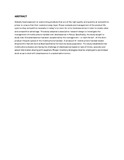| dc.contributor.author | Mulwa, Lazarus | |
| dc.contributor.author | Kuira, Agnes Njeri | |
| dc.contributor.author | Mwangi, Michael | |
| dc.date.accessioned | 2013-03-14T11:15:43Z | |
| dc.date.issued | 2012 | |
| dc.identifier.citation | AIBUMA Conference August 2012 | en |
| dc.identifier.uri | http://hdl.handle.net/11295/13814 | |
| dc.description.abstract | Globally businesses aim at customizing products that are of the right quality and
quantity at competitive prices, to ensure that their customers stay loyal. Proper
analysis and management of the product life cycle is a key competitive necessity
in today’s no-room-for-error business arena in order to create value and
competitive advantage. This study adopted a descriptive research design to
investigate the management of mobile phone handset and obsolescence in Kenya.
Specifically, the study sought to study how this obsolescence has been
occasioned by the management – or lack thereof - of the short product lifecycle
typical of the mobile phone handset.
A census of 41 mobile phone handset dealer shops within Nairobi Central
Business District formed the study population. The study established that mobile
phone dealers are facing the challenge of obsolescence based on lack of timely,
accurate and actual information sharing with suppliers. Proper inventory
strategies must be employed to avoid dead stock so as to deal with obsolescence
in a sustainable manner. | en |
| dc.language.iso | en | en |
| dc.publisher | AIBUMA | en |
| dc.subject | Obsolescence | en |
| dc.subject | Dead stock | en |
| dc.subject | Mobile phone dealers | en |
| dc.subject | Product life cycle | en |
| dc.subject | Telecommunications | en |
| dc.title | Managing Obsolescence Cost: Case of Mobile Phone Handset in Kenya | en |
| dc.type | Presentation | en |
| local.publisher | Department of Management Science | en |

